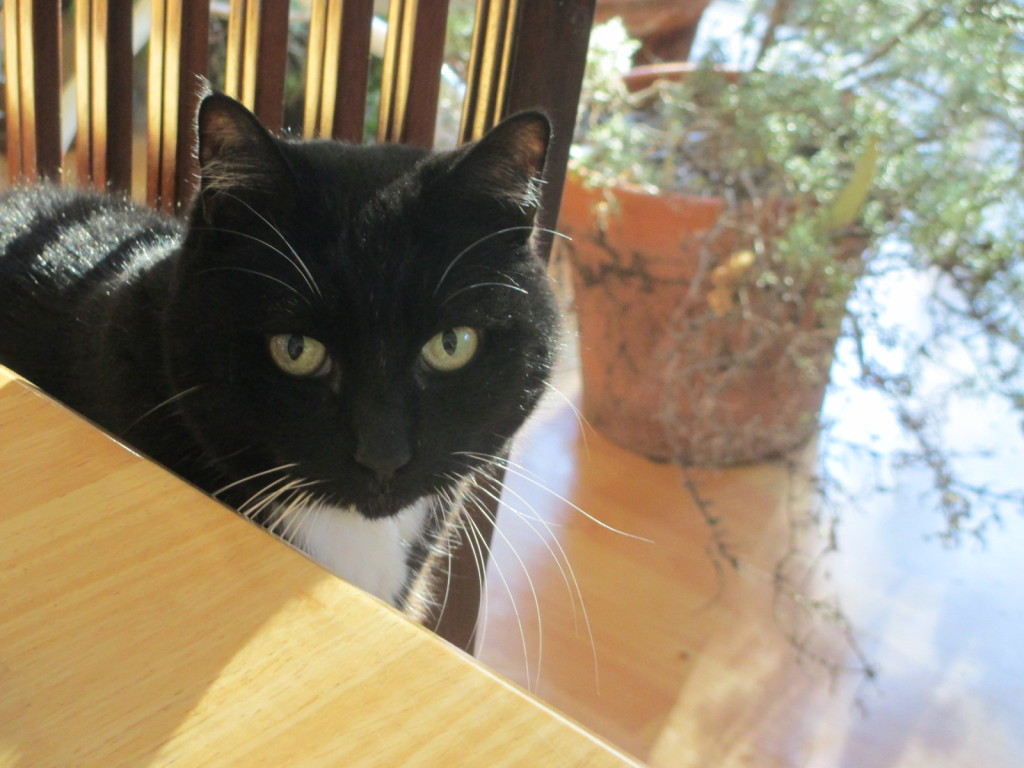Hi, I’m Bruce, and I’m a … a … a noob conlanger. (“Hi, Bruce! See, that wasn’t so hard to admit, now was it?”) Glẽžigu is the very first of what will probably be several very nooby nooblangs.
I know only a bit about its typology so far, but with the arrival of Lexember — the month of December, when some conlangers make and post a new word each day — I figured why not just jump in? Making some words will force me to think about some issues and make a few decisions about how the language works. And because it’s Lexember, I have an excuse to avoid some of those decisions, too.
Glẽžigu (whose name I didn’t even know until Lexember Day 13) is supposed to be spoken in a natural landscape similar to where I live, southern California, a mountainous desert with a seacoast. Hence some of the semantic fields that may show up, like an obsession with forms and locations and absences of water. I don’t know much about the people or history of the imaginary place where it’s spoken, but making up the words has led me to bits and pieces of that sort of knowledge too.
The orthography may need to be improved, but so far, I think it’s pretty straightforward; letters with haceks are pronounced as in Czech; vowels with tildes as in Portuguese; umlauted vowels as in German; ŋ is “ng” as in “going”; j is the approximant (Eng. consonant “y”); theta and edh are voiceless/voiced “th”; and ˈ and ˌ are stress marks, not glottal stops or clicks. (Stress is unpredictable, in Glẽžigu as in life.)
So here are the first few days’ worth of Lexember, 1 through 13. Later days’ words will be explained in subsequent posts.
[Lexember 1]
šež sky
pi- adjectivalizing prefix meaning “physically resembling”.
piˈšež (“physically resembling” + šež “sky”) blue [color]; all-covering, overarching; universal, catholic; [Roman] Catholic
Here I’m trying to do what many conlangers suggest in their advice to noobs: Don’t create a cipher of English; make words whose extended and metaphorical and connotative meanings are unique to this language, and cross boundaries of semantic fields of other languges.
I kind of doubt that any other language has a word that can mean both “blue” and “universal” depending on the context. Hey, this is fun! And “shezzzhhhhh” is fun to say, too.
[Lexember 2]
ˈkamli citrus fruit
tek- adjectivalizing prefix meaning “tasting like”.
-šõ nominalizing suffix for a quality; similar to Eng. “-ness”.
tekˈkamliˌšõ (“tastes-like-citrus-ness”) sweet-and-sour taste; the emotion known in Eng. as “bittersweet”.
[Lexember 3]
The first few numerals can be useful for deriving articles, determiners, various affixes, so I decided to count to 3 in Glẽžigu:
iš, lem, saŋ.
Saŋ is a bit of a whim: sounds a lot like Mandarin and Japanese san (“three”), so the Proto-Worlders can have some data to show that Glẽžigu is in the same language family as those plus Basque, Lwo, and Kumeyaay. And Klingon.
[Lexember 4]
beš more; more than. Both adjective and adverb. [I don’t know yet how the obj. of the implied ‘than’ inflects].
And now that we have some numbers we can make:
ˈbešaŋ several (with a specific lower bound: it’s always literally “more than 3” and in practice usually less than about 10).
[Lexember 5]
alm (prep.) with (associative, not instrumental); (adv.) together; (interj.) hello.
Eng. “with” can be both associative (as on the “I’m WITH stupid->” t-shirt) or instrumental (as in the Ian Dury song “Hit Me WITH Your Rhythm Stick”). But Gl. alm, when used as “with”, is only associative. There will be another word for instrumental “with”.
Alm is the standard greeting on both sides when people meet in person or start a telephone conversation: “we are now together”. See also mla on Lexember 9, below.
[Lexember 6]
So now I’ve got a few bits and pieces that I can start playing Lego with to make new words.
piˈkamli (pi- “physically resembling” + kamli “citrus fruit”) spherical; divisible by 2. In Eng. we have “even and odd” numbers, as well as “round” numbers (divisible by a power of 10); in Gl. the “round” or “spherical” attribute goes to numbers divisible by 2. Numbers not divisible by 2 are called something like “sharp” but I don’t know the Gl. word for that yet. This is derived from my own little bit of synaesthesia about what numbers feel like.
[Lexember 7]
ˈgleni : house. ˈglenišõ: hospitality. ˈgleniẽ: (trans.v.) give hospitality to; welcome.
In a few days this word will join with a newly invented affix to form the name of this conlang.
[Lexember 8]
Last night I went to a fabulous performance of Handel’s Messiah by the San Diego Bach Collegium at St. James By The Sea in La Jolla. During the “And the angel said” recitative I wondered what “Fear not!” would be in Glẽžigu. Unfortunately it doesn’t fit the meter of Handel’s music, but I did get a couple of words and a grammatical rule.
ˈveja not; no. (This “no” is “no” the adjective, as in “no way”, not the negative answer to a question.)
ˈüliẽ (intr.v.) to be afraid; to fear.
The negative imperative is formed with veja plus the infinitive form of the verb. (The positive imperative may be something other than the infinitive; I don’t know yet.) So:
Veja üliẽ! Fear not!
[Lexember 9]
Now for something completely silly. Of course, natural languages have silly made-up words too, like “quiz.” Remember alm, which can mean “hello”? Well, what do you say at the end of a phone call?
mla goodbye (at end of telephone call only). It’s alm (hello) backwards. This was introduced as a joke circa 1920 [hey! see me doing some con-history for my conlang!], but it caught on and is now in general use as the conventional way to sign off.
The phonotactics of Glẽžigu do not allow for the initial cluster “ml-“. This word, however, couldn’t care less about the phonotactics of Glẽžigu.
[Lexember 10]
ˈperždiẽ (intr.v.) to be born. I think this might be related to words for “appear, exist, begin”.
θaˈmaliõ (tr.v.) to give birth to. I think this might be related to words for “speak, utter”.
The choice of whether to say “I was-born” (which is an active-voice verb in Gl.) or “She gave-birth-to me” (which I think is the conventional way to put this, though you could also actually use the word/phrase “my mother” instead of “she”), probably has all sorts of pragmatics surrounding it. Is the intransitive one more egotistical — it’s all about ME? And/or is it used by people who want to imply that they had a bad relationship with their mothers? Which one is used on official forms where you have to fill in your birthday? How is each one used in metaphors such as “born again” or “I wasn’t born yesterday”?
By the way, in “discovering” these verbs, I’ve had to “discover” that Gl. is not ergative/absolutive.
It also seems that Gl. verbs’ infinitive forms can end in either –iẽ or -iõ. So maybe there are two conjugation paradigms. And maybe the vestigial “n” that has become the nasalized vowel is a clue to historic sound changes, and also maybe it shows up in certain inflectional endings. I think Gl. is more or less a fusional language, but so far I haven’t had to conjugate any of the verbs so I don’t know exactly how that’ll work out.
[Lexember 11]
I guess hearing the Messiah had me thinking about other super-duper-epic-oversized choral works, and the chorus “Sind Blitze, sind Donner” from Bach’s St. Matthew Passion was going through my head, with its list of violent imperative verbs, “zertrümmre, verderbe, verschlinge, zerschelle” (pulverize, ruin, devour, smash). So this isn’t going to be a happy-clappy day of Lexember, so let’s go with that.
šlu-: prefix involving utter destruction; cf. Ger. zer-. Like right after Wile E. Coyote goes up in flame, then crumbles.
[Lexember 12]
I guess this is the first word in my conlang that you could call a “particle” (just as archaeologists call weird stuff they dig up “a ritual vessel” because they have no clue what it actually is).
tož begins a verbatim quotation; “I/you/she/etc. said exactly the following words”; does not inflect.
bid (n.) end.
bidtož end quote
This sparked a conversation with another Lexembrist (Lyn Thorne-Alder, @ThorneWrites on Twitter) that inspired some other possible uses for this word tož. Perhaps it could be used colloquially as a one-word sentence, as in “That’s what SHE said”. Or maybe it means something like the exclamation “Word!” as in the current Eng. slang for “Yeah!” “I agree!” “Amen!” “Ain’t it the truth!”
And maybe this means that Gl. has lots of these one-word-sentence colloquialisms. Like “Fail!” in current English.
[Lexember 13]
My nooblang finally gets a name today.
-šiku, -žigu suffix for forming demonyms/gentilics.
Why two? There’s a sort of consonant harmony going on here. If the last consonant in the place-name being suffixed is unvoiced, use the unvoiced version of the suffix; if voiced, use the voiced version.
So Aˌmeriˈkašiˌku, because Amerika has unvoiced /k/ as its last consonant But ˌMakeˈdõžiˌgu, because Makedon (Macedonia) has /d/. (The /n/ at the end doesn’t count because it’s going to get nasalized into the /o/ when the suffix is added. I don’t know if that makes phonological sense but I think that’s how this language works. I don’t know what general rule that implies. More things to sweep under the rug for later. Like after I take a course on that stuff.)
Hence the name of this language, Glẽžigu (< gleni = house/home/Heimat). It’s the language “of or pertaining to home”; it’s “what we speak here.”
I notice that I’m assuming that these suffixes can form both adjectives and nouns (“the American people” and “an American”). I don’t know if that’s going to be possible or whether one of those parts of speech will have to have a different ending. I thought maybe one would end in “-u” and one in “-o” but again I’ll sweep that under the rug for later.

